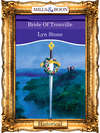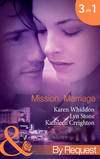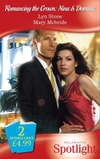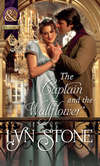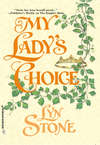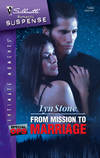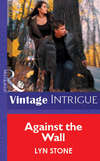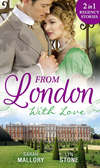Buch lesen: «Bride Of Trouville»
Praise He smiled that wickedly intimate smile of his. Letter to Reader Title Page About the Author Dedication Chapter One Chapter Two Chapter Three Chapter Four Chapter Five Chapter Six Chapter Seven Chapter Eight Chapter Nine Chapter Ten Chapter Eleven Chapter Twelve Chapter Thirteen Chapter Fourteen Chapter Fifteen Chapter Sixteen Chapter Seventeen Chapter Eighteen Chapter Nineteen Chapter Twenty Epilogue Copyright
Praise for Lyn Stone’s
previous titles
The Knight’s Bride
“Stone has done herself proud with this delightful story that incorporates a cast of endearing characters and a fresh, innovative plot.”
—Publishers Weekly
The Wilder Wedding
“...a wonderfully wild adventure...5 s.”
s.”
—Affaire de Coeur
“This romance hits all the right spots.”
—Romantic Times
Thar Arrangement
“The words are a symphony of notes that will be remembered long after the last note is performed. ”
—Rendezvous
The Wicked Truth
“Stone has an apt hand with dialogue and creates characters with a refreshing naturalness.”
—Publishers Weekly
“...Lyn Stone could well be a writter ahead of her time.”
—Affaire de Coeur
He smiled that wickedly intimate smile of his.
“I want you here, exactly as you are now.”
Anne gasped. “But—you are to sail! You told me you must meet your ship! Your home is in France!”
All the time she spoke, Edouard kept shaking his head slowly side to side. “My home is here, my love. Here with you and our sons. I meet the ship to collect all that my factor has sent from my estates. How could you believe that I would wed and then leave you?”
Anne gave no answer, for she was speechless. Speechless and terrified.
Even the concern evident in his words did nothing to reassure her. “It is small wonder you are surprised,” he said, “but I never realized you had so misunderstood me. Are you not happy that I am returning soon, my sweet?”
Returning? Ob, mercy. What now?
Dear Reader,
This month we’re giving you plenty of excuses to put your feet up and “get away from it all” with these four, fantasy-filled historical romances.
Let’s start with a spine-tingling arranged marriage in Bride of Trouville by rising talent Lyn Stone. It’s a spin-off of her terrific Medieval. The Knight’s Bride, but you needn’t have read that one to enjoy this breathtaking romance. Here, the Comte de Trouville flees France to marry a young Scottish widow. Lady Anne MacBain has no wish to wed again—especially since she must hide her son’s deafness. But she never counted on her husband falling in love with her—or she with him—which makes her secret harder and harder to contain....
USA Today bestselling author Ruth Langan is back with Conor, the second book in her miniseries, THE O’NEIL SAGA. The roguish rebel Conor is charmed by an Irish noblewoman who helps unravel a plot to murder Queen Elizabeth. And if you enjoy soul-searching Western romances with half-Apache heroes, don’t miss The Merry Widows—Sarah by the gifted Theresa Michaels. Here, a single father finds love—and a mother for his sons—with the self-reliant Sarah.
Finally, we have a pretend marriage between an abandoned wife and her widower neighbor when she moves in to help care for his daughter in The Rancher’s Wife by Lynda Trent.
Whatever your tastes in reading, you’ll be sure to find a romantic journey back to the past between the covers of a Harlequin Historical®.
Sincerely,
Tracy Farrell
Senior Editor
Please address questions and book requests to:
Harlequin Reader Service
U.S.: 3010 Walden Ave., P.O. Box 1325, Buffalo, NY 14269
Canadian: P.O. Box 609, Fort Erie, Ont. L2A 5X3
Bride of Trouville
Lyn Stone

LYN STONE
A painter of historical events, Lyn decided to write about them. A canvas, however detailed, limits characters to only one moment in time. “If a picture’s worth a thousand words, the other ninety thousand have to show up somewhere!”
An avid reader, she admits, “At thirteen, I fell in love with Brontë’s Heathcliff and became Catherine. Next year, I fell for Rhett and became Scarlett. Then I fell for the hero I’d known most of my life and finally became myself.”
After living four years in Europe, Lyn and her husband, Allen, settled into a north Alabama log house that is crammed to the rafters with antiques, artifacts and the stuff of future tales.
This book is dedicated to my son, Eric Stone, and
all the others who have conquered the silence
and made their way in the hearing world.
You are my heroes, every one.
Chapter One
France, Summer, 1318
“Another wife is what you need. And I have the perfect woman for you this time!”
Bdouard Gillet, comte de Trouville, shot the impertinent baron a weary look of forbearance. Here was all he needed to make a disastrous day complete. “I do believe we indulged in this conversation four years ago, Hume. To no good end, I might add.”
He spurred Bayard gently and rode on ahead. The killing heat had abated somewhat as they pushed farther north, but he itched from the collected sweat beneath his padded gambeson and chain mail. Thank God, he’d dispensed with the heavy helm. His troubling thoughts gave him headache enough. And now he must tolerate Hume’s noxious presence. A wife, indeed. The man must be mad to suggest it.
Dairmid Hume maneuvered his mount so that it drew abreast again, and continued, blithely undeterred by Edouard’s contempt. “Your fine lad there could use a mother to impart the ways of courtesy, could he not?” He nodded toward young Henri who traveled several lengths ahead of them. “And if I recall correctly from our former dealings, my lord, you are well past thirty now. Not getting any younger!”
Edouard grunted, a near laugh. “You are the soul of tact, Hume. I do wonder how you have kept your head attached.”
He could not abide this man. Wed to a French noblewoman, the Scots baron had long served as a go-between for the kings of France and Robert the Bruce of Scotland. Hume used any royal association he could foster to elevate his stature at court.
Just as he had four years earlier, the baron obviously had in mind Edouard’s kinship to King Philip and how it might prove useful to him. What would be the man’s reaction if he knew his current prey had just been banished from court by his royal cousin, Edouard wondered?
Philip’s order was not official, but when this particular king grew red in the face and shouted, “Get you from our sight!” he left little room for debate. Not that Edouard would have argued the matter. Though he had spent almost all his years in royal company, he welcomed the change if not the circumstances that caused it.
As comte de Trouville, he counseled the king and planned strategy. He fought and would die for France, but insinuating himself into the English court and gathering intelligence in the indecent manner suggested definitely was not his way. Philip was wrong to demand it of him, and Edouard had told him so.
The king would deal out some kind of punishment for Edouard’s rebellion, no doubt of that, and it would not be long in coming. A wise man prepared for the worst. He would not only leave court, he would leave France altogether.
Thus it was that Edouard, his son, and two knights found themselves upon the road headed north. That they had happened on Hume and his retainers along the way had done nothing to brighten Edouard’s mood. Even so, combining their small parties and riding seven together provided a safety from brigands that Edouard, in his haste to leave court, had found no time to arrange.
He was bound for the low countries. From there he would await word of the king’s plans for him. Possibly that would entail nothing more than forfeiting his role as counselor. Or he could lose his estates, certainly a more dire consequence. In the worst case, he might face a charge of treason.
Wouldn’t Hume fly into retreat on this offer if he knew that! Edouard was almost tempted to tell him, just to see his reaction. But, thus far, he had told no one, not even his son or the two knights who accompanied him. Their duty was to follow where he led and to do so without question.
Hume pushed on. “I’ve only your best interests in mind, my lord.” He held up a hand to halt Edouard’s objection. “You remain unwed, disgusted by my daughter’s foolery, no doubt. But all that’s over and done, and needs be forgotten, eh?”
“Believe me, I have no great desire to recall it,” Edouard said with a wry twist of his lips. “Nor should you if you are wise.”
The baron sighed. He clicked his tongue and shook his head as if sorely dismayed. “You know I would have preferred you as a son-by-marriage to that highland mercenary she chose. I truly do regret my daughter’s actions and her declination of your suit.”
Declination of his suit? Edouard almost laughed aloud at how prettily Hume phrased it. She had run for her life four years ago, or so she thought The poor woman had been terrified at the very idea of wedding him, the dreaded comte de Trouville, a man who had buried two wives and held a reputation worthy of the devil’s own get. Even when Edouard had traveled to Scotland to reclaim her, the little spitfire had defied them all. Declination of his suit, indeed. Small wonder Hume bore the title of diplomat.
Edouard had only himself to blame for his black reputation. He might have changed Lady Honor’s opinion of him, if he had bothered to explain away the rumors that made him so feared.
Since he had not, the woman took it upon herself to arrange her own destiny and fled to Scotland, altered her marriage documents and wed another. He secretly admired her spirit and courage even more than her incredible beauty. In an uncharacteristic fit of sentimentality, he had even fancied himself in love with her for a time.
He had gone after her to slay the Scot she’d wed, intending to make Lady Honor a widow. Perhaps he should have killed them both when he had the chance. Instead, he had given the Scot a sword and offered to fight for the woman.
Edouard’s sudden sneeze in the midst of that encounter had decided the matter. Lying flat with a blade at the throat tended to cool a man’s ardor considerably.
Now here he was, riding along the road beside the woman’s wretched father, with the idiot eager to propose yet another match. Risking an attack by brigands might have been preferable, after all.
He paused in his mental diatribe as a sudden idea occurred. Hume might be of some use yet. Edouard needed lands outside of France now. Living in the low countries, even though most of his shipping enterprises were based there, did not appeal to him in the least. But Scotland might. What he had seen of the wild, free country had impressed him.
Edouard turned in his saddle to speak directly. “How does that daughter of yours these days?”
Hume’s chest puffed out. “Ah! She gave me a grandson this year. That is where I am going now. Business and pleasure.”
“A portion of Lady Honor’s dower lands lie in Scotland, do they not?” Edouard asked the baron.
“Aye, a small keep to the north.” Hume assumed a penitent expression. “I still say you should have taken at least a part of her dowry as settlement for her treachery. Honor even suggested that as reparation, if you recall.”
“No. The lands are hers.” Edouard paused only a moment before adding, “However, I might be willing to purchase that particular property if she and that husband of hers are like to part with it. And if it suits my needs, of course.”
“I have a much better idea, my lord, if you would only consider. You may gain an estate, free and clear! And the income from another!” Hume straightened in his saddle, his calculating smile warning of the aforementioned proposal.
“I do hesitate to ask how,” Edouard muttered.
Hume ignored the sarcasm. “You see, I have a niece, my sister’s only get, who was recently widowed. A comely lass, Anne was when last I saw her, and now she is mother to a fatherless lad of ten. Both of you, as well as your sons, would benefit by an alliance. And it would soothe my conscience with regard to my daughter’s treachery,” Hume said. “I shall have to match my niece with someone while I am in Scotland, and who better than yourself? You see how fate has intervened here?”
Fate. As much as he disliked the man, Edouard wondered if Hume might not be right. Strange that providence had thrown the two of them together at such a time. A time when Edouard really did need a new home, a wife and a mother for his son.
If this niece of Hume’s was anything at all like the Lady Honor... Well, it would not hurt to listen to what the old devil had to say.
“You have disposition of her? What of her parents?”
“Dead for some years, my lord. Her son inherits the Baincroft holdings, but Anne owns those adjoining it. You should gain an adequate income from both. Also, you will have at least eight years to enhance her property while administering her young son’s estate for him. War never touched either place and profits from both are excellent. Trust me, these lands are better located than those you offer to purchase from my Honor and Alan of Strode.”
Edouard did not reject the notion out of hand. No woman since the Lady Honor had appealed to him as a candidate for wife. So unsuitable were those available, he had not even considered marriage for some time now. The French court tended to attract women like his mother, jaded, promiscuous and power hungry. Hume’s suggestion bore looking into.
“One lad of ten, you say, and none since? She must be past bearing,” Edouard said. No man wished a barren wife.
Hume appeared worried as he fingered his beard. “Anne’s twenty-seven, I believe. Aye, that would be right, for she wed at sixteen.” He brightened. “’Twas her husband’s fault she quickened no more. I’m certain of it. He was near sixty, after all.”
“Could be,” Edouard replied noncommitally, but Hume’s supposition made sense. She had already borne one child successfully, and would very likely have more with a younger husband. Being a father again appealed to Edouard.
Owning an estate outside of France appealed even more at the moment. Hume’s offer had merit if the woman did prove suitable.
And the baron was right about a mother for Henri. Living between their bachelor keep and the debauchery of the court had rendered the boy something of a hellion. Learning a few social graces from a feminine hand might soften his rough edges.
The more he thought on it, the greater Edouard’s interest grew. He disliked Hume personally, but the man had fathered that wondrous creature Edouard once despaired of losing. Might his sister have produced one as well?
“Describe her to me, warts and all,” he ordered.
Hume laughed. “No warts, my lord. Anne’s very like my Honor in appearance. Skin smooth as new cream. Her hair, a bounteous length of fine, dark waves. Eyes like the deep, mysterious waters of a highland loch.”
So Hume would wax poetic, Edouard mused. He listened tongue in cheek as the proud uncle continued, “I recall that shining mane rippling to her waist the day she wed. Exquisite eyes with a wee tilt to them. Both lasses carry the look of my mother, who remained lovely well past her prime. In temperament, Anne has proved far more tractable than my Honor, however. She did her duty as she was bidden, and will again.”
Edouard wondered what kind of persuasion had been required to compel a sixteen-year-old girl to wed a man more than thrice her age. But Hume seemed confident of the woman’s acceptance should Edouard choose to offer for her.
On the off chance that he might do so, Edouard decided to send Sir Armand with a letter to his factor in Paris. He would order the man to collect and forward all the portable goods from the French properties to Scotland.
The bulk of his ready coin and jewels, Edouard carried with him now, in the event his royal cousin leaned toward confiscation of the estates. The profits of his investments in the low countries could easily be directed to Scotland, as well.
Even if nothing came of the meeting with Hume’s niece, Edouard could build or purchase a place and live quite comfortably near Edinburgh.
The more he thought on it, the more he welcomed this necessary change from his former life. Yes, why not begin anew in Scotland, free of the intrigue and machinations necessary to retain his niche in the royal circles of France? That would suit him admirably, whether he wed this Scotswoman or not.
Until now, he had never seriously considered how weary he was of it all, or how detrimental life at court might be proving to Henri’s character.
Fate might very well be at work here.
Hume shifted impatiently in his saddle. “Well, what say you, my lord?”
“Very well. I will meet this niece of yours. Then we shall see. But I warn you now, I would have no unwilling woman to wife. Should I decide to offer for the Lady Anne, there will be no coercion on your part as there was with your daughter, Hume. Is that clear?” He pinned the man with a warning glare. “None at all.”
The baron answered with a beatific smile. “Oh, none will be necessary, my lord. My niece will delight in you, I am certain.”
Two weeks later, Lady Anne stood in the hall of Baincroft’s Keep, aghast at her uncle’s dreadful suggestion. Another marriage? She could not accept this, would not.
She cursed the wretch who notified him that her husband had died. Though she realized that news from Scotland must reach the French court with some regularity, Anne had hoped that the death of a minor Scots nobleman would prove too mundane to report. Apparently, it had not.
“The comte de Trouville delayed to inspect your dower lands and will be arriving directly. I came ahead to prepare you and to assure you that he is perfect! Just think, my dear, his title equals that of earl, and you shall be a cormtesse, a countess!”
He reached for her hands, but she jerked them away. Then, mindful of his absolute control over her, she softened the hasty act with a forced smile. Nothing would be achieved by rebellion.
True, she had met her uncle only twice before in her life including this visit, but clearly, he took their kinship quite seriously.
“I know what his tide equates to, Uncle. But I swear to you, Robert and I can manage Baincroft quite well on our own. He gained the age of reason three years ago. His people love him and are eager to serve him as lord, despite his youth. I truly have no wish to wed again. Kindly humor me in this, I beseech you.”
She saw at once how his choler rose, and that she could not reason with him, no matter how sweetly she spoke.
“Humor you?” He spat angrily into the rushes and then leveled her with a furious look. He shook a finger in her face. “You heed me, Anne, for I have no time to bring you round nicely or whip you into submission. Trouville is cousin to the French king. I need this connection and I’ll brook no reluctance on your part. You utter one word, offer a single look of denial to this man’s proposal, and that son of yours will be on his way to France with me on the next ship.”
Anne could not stifle her cry of protest.
He nodded and smiled evilly when he heard it. “Aye, you did strike me as a mother hen when you spoke of your one and only chick. You will not see your precious Robert again if you refuse me this. I have the right to his fostering, you know! Eight long years, Anne. Think on that.”
Anne closed her eyes and fought the fury exploding inside her. First, her father had forced her to marry MacBain, a man much older, wealthier, and more hateful than her sire had been. Eleven years, she had spent in hell here. Eleven years of enduring constant calumny, sometimes outright cruelty. And nearly nine years of hiding from his sight the son MacBain grew to hate.
Now her uncle would throw her right back into the pit of despair she had just escaped by the grace of MacBain’s death.
Though it galled her to submit to yet another marriage, keeping Robert by her must be her first concern. Even had he the ability to survive fostering with another, she could never allow him into her uncle’s keeping. He would not last the day.
She could tell her uncle the truth, of course, and he would not wish to foster Rob. But if Dairmid Hume ever discovered Robert’s one weakness, he would never allow her son to keep Baincroft. Her uncle would apply to the king to give the lands to him as next male kin to Rob.
He would demand to know how a lad who could not hear or properly speak could ever hope to rule or hold what he had inherited. All would be lost. No one in authority would uphold Rob’s rights or stand for him in the matter. The courts would agree with Lord Hume.
This she knew, because not one year past, Gile Mac-Guinn’s castle and his title had passed to his younger son when the elder, not yet eighteen years of age, had been blinded in an accident. The former heir now lived upon his brother’s charity. The precedent seemed all too clear to Anne.
She alone could save her son’s birthright.
Thank God, Robert’s problem proved invisible. Even so, deafness was not an easy thing to conceal. She had counted upon MacBain’s reluctance to admit publicly that he had fathered such a child, and on his hope for another son not so afflicted. Now that the old man was dead, she depended upon the love of those who served Rob to assist her in hiding his disability.
As it was, if their secret remained secret, she could hold Baincroft in her son’s name until he came of age. By that time, she would have surrounded him with so much support, no one could oust from him his rightful heritage. And she would have proved to his liege, Robert Bruce, that her son’s demesne had run smoothly and profitably for years under Rob’s care, despite his deafness.
Her marriage would remove the immediate threat of her uncle, right enough, but would only supplant it with another. This comte he had brought to wed her could just as well usurp Rob’s lands and, using his influence with the French king, attain King Robert Bruce’s blessing on the theft.
The best she could hope for was that this French noble only wanted her adjoining property and the income from it. She needed to find out how things stood now. “You mentioned his royal affiliation. Will the comte be returning to France soon, then?”
Hume spoke more calmly, obviously assured of her obedience. “Oh, definitely he will. Trouville’s a very important man and King Philip will have need of him. Aside from his role as advisor, Trouville always participates in the tournaments as the king’s champion. Aye, I’m certain he must return there soon.”
She nodded. “I see. I suppose he merely wishes to establish an estate here for the added income it will bring him. Is that not right?”
“Of course. What other reason would he have? It is not as though he desires your person 1” He smiled at her then, as if he had not just resorted to threats to gain his way. ”Though he will want you once he sees you, my dear. If you serve him well as wife, he might even ask you to accompany him to court. Every woman’s dearest dream, of course. You will love it there.”
Well, she would see to it he left her here. Here, so that she and her son might go on as they had since MacBain’s death. She would keep Rob’s secret from both of these men, at all costs, even though she would have to concede in the matter of this marriage.
This comte could hardly be worse than MacBain had been, and she could bear anything for the duration of his time here. Anything, to regain a measure of the peace and freedom she had found, and safety for her son. If she refused this man, her uncle would only find her another, one who might remain at Baincroft forever. And, in the meantime, he would take Rob away. God forbid that should happen.
Anne nodded once. “Very well, if you vow to leave my Robert to me, I will do this for you.”
“Gladly promised.” He nodded, all affability. “I knew you would see the wisdom of it.”
She quickly ordered one of the maids to go above and clear the master chamber for guests, and have an additional room readied for her uncle. There was no time to do more.
The door to the hall swung open. A stalwart young lad wearing rather costly-looking raiment marched through it as though he owned the keep.
Two knights entered behind him, their spurs scraping the floor beneath the thin layer of rushes. Shining basinet helms, jingling mail aventails still attached, rested in the crooks of their left arms. Massive swords hung in scabbards at their waists. A formidable sight, these two. Anne resisted the urge to step back.
The boy halted a short distance in front of them, bowed formally to her and her uncle and announced, “The comte de Trouville, my lady, Lord Hume.”
Anne had no trouble discerning which knight bore the tide. He would be the dark one. If his air of absolute supremacy had not proclaimed it, then his exemplary attire would have done. He wore a knee-length surcote of deep madder lake—near the color of ripened plums—emblazoned with a black-and-silver device. His sword bore several magnificent jewels in the hilt, and Anne marked not a dot of rust marring the links of his mail. Travel dust would never have dared settle on such a one.
His companion paled rather literally by comparison. Fair-haired, garbed in sky blue trimmed with white, the other stood a hand width shorter and not so broad. Even were he as richly turned out, Anne would never have mistaken him for his lord. He lacked the commanding presence and assuredness of the other.
Still, they both appeared so grandly dressed to impress, she felt like asking where the tournament was.
Her uncle gave her a little shove from behind. “My lord comte, may I present my niece, the Lady Anne.”
The comte extended his right gauntlet to the boy who promptly tugged it off. Then, gracefully, he bowed and Anne automatically extended her hand. He raised it to his lips and barely brushed the back of her knuckles. He would have missed the contact altogether had she not shuddered at his touch.
“Welcome to Baincroft, my lord,” she said, trying not to sound as breathless as she felt. Many men had visited her father and her husband, but never in all her days had she laid gaze upon one such as this.
Dark as sin, he was. Midnight hair hung to the edge of the curved steel gorget that protected his neck. Long-lashed eyes the color of polished walnut regarded her with frank curiosity and not a little admiration.
Anne felt her face redden under his scrutiny. She wore one of her older gowns, a russet linen, and no headrail at all. MacBain had required her to don those old-fashioned wimples, since discarded, and she owned no other head coverings. No matter. So much the better if Trouville thought her unfashionable. He would leave her in Scotland where she belonged.
For a man coming off a tedious journey, he arrived remarkably groomed, clean-shaven, combed and exuding no unpleasant odors. Did he never sweat?
His features, while refined, held none of the soft comeliness she would have expected on a courtier. Nor did his form. He appeared battle hardened and muscled by frequent exercise, judging by his carriage, the width of his shoulders and narrowness of his waist and hips. Devastatingly handsome and self-confident described him well. Frightening described him better. Dealing with this one would take some doing.
He straightened and finally released her hand. “My lady, may I make known to you Sir Guillaume Perrer, knight in service to me.” He waited until the man made his bow. “And our herald this day, my son and heir, Henri Charles Gillet, Esquire.”
Anne regarded the serious young face that mirrored the father’s. Young for a squire, she thought. He looked hardly more than thirteen. His manners seemed as impeccable as his sire’s.
“Henri? See that fellow there beside the stair? He will show you to the chamber where you and your father will bide.”
As an afterthought, knowing well the constant hunger of growing lads, she added with a smile, “We sup in one hour. I trust you like sweets?” He rewarded her with a sudden grin that changed his whole appearance.
When she returned her gaze to the father, she noted an expression of relief, almost as transforming as the grin on his son. “Will you sit and take wine, my lord? You and Sir Guillaume must be weary.” She gestured toward the dais.
“My thanks, but I would go above with my son and disarm.” He turned to his knight. “Find the barracks, Gui, and join us here for the evening meal.”
Anne hurriedly took herself to the kitchens to give orders for extra food. Then she sent Simm, her steward, to locate her son quickly and send him to her chambers.
During supper, the comte held the seat of honor, her uncle on his left and she, at his right. Young Henri served his father and stood behind his chair. His man and her uncle’s attendants sat at the lower tables with her priest, just above the steward, and others of the household.
Never once did the noble lord comment on the meager fare dished out to her unexpected guests. Neither did he remark upon the state of the keep itself. While scrupulously clean, Baincroft boasted none of the frivolous amenities he must be accustomed to in his own. Surely he would have no wish to remain here for long, she thought with satisfaction.
Best of all, he made no mention of her missing son. Robert, by all rights, should have joined them at table, or in lieu of that, served as page.
